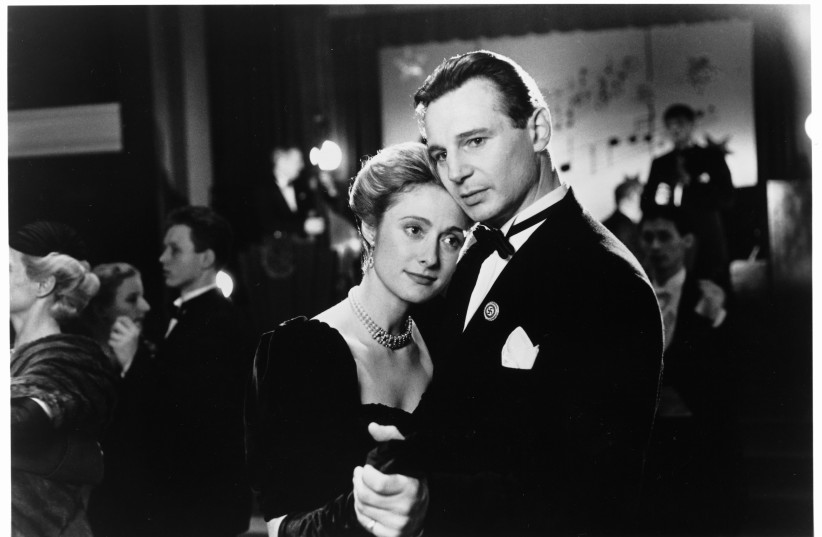The Auschwitz Report details a fascinating chapter in Holocaust history, the escape of two Slovakian Jews from that death camp who went on to provide some of the most detailed accounts of the slaughter taking place and, equally important, were able to impress upon officials that they were credible witnesses.
It is not an easy film to watch, but it tells a relatively little-known story with haunting images, top-notch acting and a lean script that avoids clichés.
On September 24, the movie is being released in a number of US theaters, as well as digital platforms, including iTunes, Amazon, Google Play, Vudu-FandangoNow and a number of cable and satellite VOD services. In Israel, the film has been acquired by Yes, although no release date has been announced.
The movie, directed by Peter Bebjak, was Slovakia’s official selection for the Best International Feature Oscar in 2021.
It stars Noel Czuczor as Alfred Wetzler and Peter Ondrejicka as Rudolf Vrba, two Jews deported to Auschwitz in 1942 who were obsessed with telling the story of the horrors of the death camps to the world.
They kept records of the slaughter, both by taking notes and by memorizing the numbers as much as they could. In 1944, after months of planning and the help of their fellow inmates, who risked death and torture to aid them, they made their seemingly hopeless attempt.
This movie follows the recent trend of realistic Holocaust movies.

In Holocaust films such as Steven Spielberg’s Schindler’s List and Tim Blake Nelson’s The Grey Zone, which are in English and feature well-known actors, these two elements constantly distance you from the reality on screen (you might be reminded of Liam Neeson playing opposite Mia Farrow in Woody Allen’s Husbands and Wives while watching Schindler’s List, or David Arquette as a bumbling cop investigating a serial killer in Scream as you see The Grey Zone) and mute the impact to the point of absurdity.
The bar for Holocaust movies was raised considerably with the release of Son of Saul by László Nemes in 2015, which told a harrowing story of the Sonderkommando and showed every aspect in full color and great detail.
In The Auschwitz Report, as in Son of Saul, all the characters speak in the languages they would have actually used: German when talking to the guards, and their own languages with each other, including Slovakian, Czech and Polish, which adds immeasurably to the sense of realism. The fact that Noel Czuczor and Peter Ondrejicka are not household names outside of Slovakia helps as well.
And, again like Son of Saul, The Auschwitz Report is not filmed like an art house film, with carefully arranged shadows and slow plotting, but is an action movie, showing the nonstop activity of the death camp machine and the minute-by-minute threat to prisoners on work detail.
As you see the cruelty and inhumanity play out, you can understand what motivated Alfred and Rudolf, who were young and healthy prisoners, more likely than most to survive, to take the enormously risky step of staging their flight, knowing that those they left behind were going to pay the price.
What differentiates this movie from virtually every other Holocaust film are the scenes in which they face down a British Red Cross official (John Hannah), who accepts the German Red Cross version of events and believes that prisoners are treated well and cannot believe what they have written in their report. The two lead actors excel in these scenes, using logic to try to convince this recalcitrant bureaucrat who knows if he admits he was duped by the Nazis, he will have been complicit in their crimes and, even more daunting, he will now be forced to take action. It’s hard to keep from yelling at the screen as he clings to the official German version of events. The quiet dignity of the escapees convincing him by any means necessary commands great respect.
ALTHOUGH THE report was given to officials and eventually released to the press, it did not lead to the bombing of the death camps, as Wetzler and Vrba had hoped, but it did eventually bring about a halt to some of the mass deportations of Hungarian Jews, saving lives toward the end of the war, according to reports from various historians.
The movie itself may have had some impact on the Slovakian government. Earlier this month, it finally issued a formal apology for the “Jewish Code” laws that stripped Jews’ rights during World War II, 80 years after the codes were passed. The government said in a statement that it “feels a moral obligation today to publicly express sorrow over the crimes committed by the past regime.”
The Auschwitz Report is a powerful enough movie that it seems plausible that it could have had real influence. For anyone who is interested in on-screen depictions of the Holocaust, it is a must-see.
